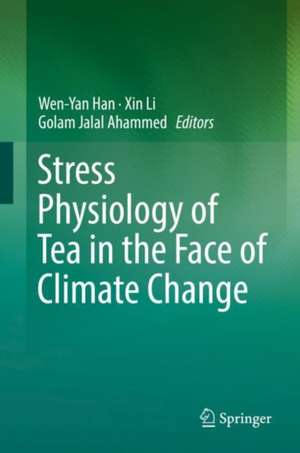Stress Physiology of Tea in the Face of Climate Change
Editat de Wen-Yan Han, Xin Li, Golam Jalal Ahammeden Limba Engleză Hardback – 14 dec 2018
Dr. Wen-Yan Han is a Professor and Dr. Xin Li is an Associate Professor at the Tea Research Institute of the Chinese Academy of Agricultural Sciences (TRI, CAAS), Hangzhou, PR China. Dr. Golam Jalal Ahammed is an Associate Professor at the Department of Horticulture, College of Forestry, Henan University of Science and Technology, Luoyang, PR China.
Preț: 956.81 lei
Preț vechi: 1166.84 lei
-18% Nou
Puncte Express: 1435
Preț estimativ în valută:
183.09€ • 195.78$ • 152.65£
183.09€ • 195.78$ • 152.65£
Carte disponibilă
Livrare economică 27 martie-10 aprilie
Preluare comenzi: 021 569.72.76
Specificații
ISBN-13: 9789811321399
ISBN-10: 9811321396
Pagini: 386
Ilustrații: XVIII, 361 p. 36 illus., 19 illus. in color.
Dimensiuni: 155 x 235 mm
Greutate: 0.77 kg
Ediția:1st ed. 2018
Editura: Springer Nature Singapore
Colecția Springer
Locul publicării:Singapore, Singapore
ISBN-10: 9811321396
Pagini: 386
Ilustrații: XVIII, 361 p. 36 illus., 19 illus. in color.
Dimensiuni: 155 x 235 mm
Greutate: 0.77 kg
Ediția:1st ed. 2018
Editura: Springer Nature Singapore
Colecția Springer
Locul publicării:Singapore, Singapore
Cuprins
Chapter 1. Global climate change, stress and tea production: Present and future.- Chapter 2. Understanding response of tea plants to heat stress and the mechanisms of adaptation.- Chapter 3. How tea plants deal with low temperatures?.- Chapter 4. Response of tea plants to moisture stress.- Chapter 5. Low light-induced changes in tea metabolite- A review.- Chapter 6. Ultraviolet (UV) radiation and Ozone: molecular and physiological adaptations in tea.- Chapter 7. Elevated carbon dioxide-induced perturbations in metabolism of tea plants.- Chapter 8. Nutrient deficiency or abundance in tea plants: Metabolism to productivity.- Chapter 9. Understanding and exploiting the impact of heavy metals stress on tea physiology and quality.- Chapter 10. Differential changes in tea quality as influenced by insect herbivory.- Chapter 11. Molecular and physiological mechanisms of defense against pathogens in tea plants.- Chapter 12. Role of micro-organism in improving stress tolerance of tea in the context of global climate change.- Chapter 13. Plant hormones as mediators of stress tolerance in tea plants.- Chapter 14. Understanding metabolomics of tea for improving stress tolerance.- Chapter 15. Toward the development of climate resilient tea: Physiological and molecular intervention.
Notă biografică
Dr. Golam Jalal Ahammed is from Zhejiang University, Hangzhou, China.
Dr. Wen-Yan Han and Dr. Xin Li are from Tea Research Institute, Chinese Academy of Agricultural Sciences, Hangzhou, China.
Dr. Wen-Yan Han and Dr. Xin Li are from Tea Research Institute, Chinese Academy of Agricultural Sciences, Hangzhou, China.
Textul de pe ultima copertă
This book focuses on the existing knowledge regarding the effect of global climate change on tea plant physiology, biochemistry, and metabolism as well as economic and societal aspects of the tea industry. Specifically, this book synthesizes recent advances in the physiological and molecular mechanisms of the responses of tea plants to various abiotic and biotic stressors including high temperature, low temperature or freezing, drought, low light, UV radiation, elevated CO2, ozone, nutrient deficiency, insect herbivory, and pathogenic agents. This book also discusses challenges and potential management strategies for sustaining tea yield and quality in the face of climate change.
Dr. Wen-Yan Han is a Professor and Dr. Xin Li is an Associate Professor at the Tea Research Institute of the Chinese Academy of Agricultural Sciences (TRI, CAAS), Hangzhou, PR China. Dr. Golam Jalal Ahammed is an Associate Professor at the Department of Horticulture, College of Forestry, Henan University of Science and Technology, Luoyang, PR China.
Dr. Wen-Yan Han is a Professor and Dr. Xin Li is an Associate Professor at the Tea Research Institute of the Chinese Academy of Agricultural Sciences (TRI, CAAS), Hangzhou, PR China. Dr. Golam Jalal Ahammed is an Associate Professor at the Department of Horticulture, College of Forestry, Henan University of Science and Technology, Luoyang, PR China.
Caracteristici
Reviews all aspects of breeding methods and tea improvement technology and applications including stress physiology Presents an excellent source of knowledge regarding stress management in tea cultivation Provides useful information for sustainable tea cultivation as well as efficient management of tea garden in the context to adverse global climate change in near future
